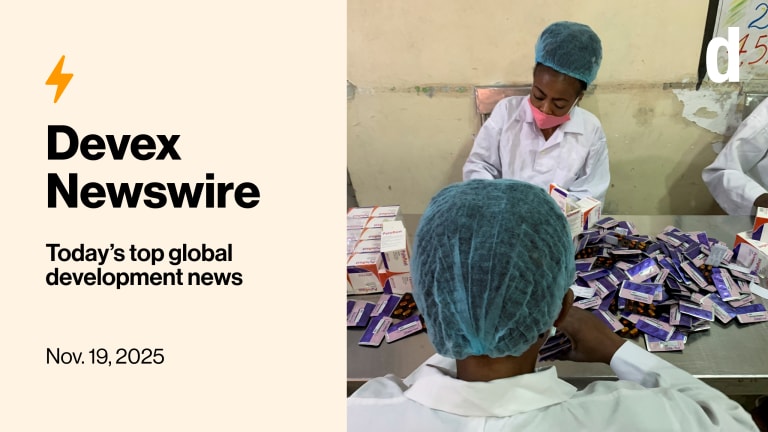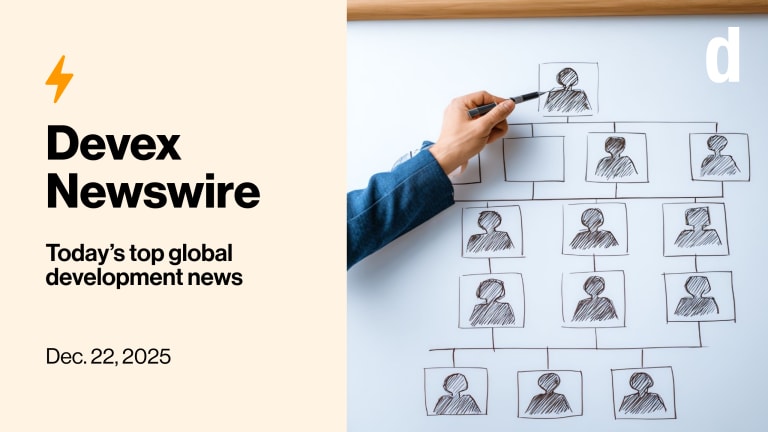
Ndidi Okonkwo Nwuneli, initially hesitant, became ONE's first African leader, bringing a fresh perspective to the advocacy group focused on ending poverty and disease. Despite ONE’s challenges, her expertise in African agriculture and nonprofit leadership promises a new chapter.
Also in today’s edition: UNAIDS is having a funding crisis, and more ruckus at the Organisation of African, Caribbean and Pacific States.
She’s the ONE
When Ndidi Okonkwo Nwuneli was asked to lead ONE, one of the world’s most influential advocacy organizations, her first thought was, I’m not the right person for this, she tells my colleague Elissa Miolene.
A seasoned entrepreneur, agriculture expert, and nonprofit leader, Nwuneli hesitated. “I’ve always admired ONE’s work, but I just thought it wasn’t for me,” she says. But reflecting on her work in Africa and the need for African voices on the global stage convinced her to take the leap.
This is a preview of Newswire
Sign up to this newsletter for an inside look at the biggest stories in global development, in your inbox daily.
Now Nwuneli has stepped up and became ONE’s first African leader, heading an organization dedicated to ending extreme poverty and preventable diseases. “This is a chance to work with African leaders to shape our own vision for Africa,” she says.
Nwuneli’s arrival marks a new chapter for ONE, which has faced departures, layoffs, and strategic shifts. Co-founder rockstar Bono, CEO Gayle Smith, and President Tom Hart all stepped down, and the organization cut 30% of its staff due to financial issues.
Despite such challenges, Nwuneli is optimistic. Growing up in Nigeria with academic parents, she developed an interest in the food business, selling avocados at the market at age 12. After studying in the U.S., she returned to Nigeria, founding LEAP Africa and co-founding Sahel Consulting and AACE Foods, all while championing African agriculture.
Tom Freston, ONE’s board chair, immediately saw her potential: “I interviewed 10 people for this position, with Ndidi being the very first. And she was a hole-in-one,” Freston tells Devex. “After we had our first interview, I hung up the Zoom and just thought: Wow. She is really something.”
Read more: ONE enters its next chapter with first African CEO at the helm (Pro)
From the archives: Nwuneli on the challenges of scaling impact in Africa
+ You’ll hear more from Nwuneli and other luminaries at Devex World 2024. Join us on Oct. 24 in Washington, D.C., at Studio Theater to connect with leaders shaping the future of global development. Save your spot now.
Commission critical
It may have just signed a new partnership with the 79-member Organisation of African, Caribbean and Pacific States, but in a blunt letter, seen by Devex, the EU’s top development official read the riot act to the secretary-general of the OACPS’ roughly 50-person secretariat in Brussels, which has been sustained by EU taxpayers for years.
Koen Doens, the director-general of the commission’s department for international partnerships, wrote in March to OACPS boss Georges Chikoti that “despite repeated requests (orally and in writing) for transparency on the current financial situation of the OACPS Secretariat and its viability in the short to medium term, we still lack vital information.”
And without the info, Doens wrote, no more EU funding is to be signed or disbursed.
Naturally, Devex Senior Reporter Vince Chadwick asked the commission and the OACPS if the latter had met the March 31 deadline — by which it was meant to open its books — but a commission spokesperson told us that “we do not comment on leaks.”
We have reported numerous problems at the OACPS — born in the 1970s as the main interlocutor for EU development policy, but now struggling to find a reason to exist.
From a staffer traveling with €81,556 in undeclared cash to €6 million of EU taxpayers’ money spent on a building renovation that never happened to the loss of one of its biggest members, South Africa, to the EU spending €271,500 this year to put consultants inside the OACPS finance department to try and figure out what’s going on.
Each time the commission has fobbed off our questions about whether they were concerned how EU taxpayer money was being spent. Now we know they are.
Read: EU rebukes African, Caribbean, Pacific org ‘not aligned with reality’ (Pro)
+ A Devex Pro membership gives you access to all our expert analyses, insider insights, globaldev’s largest job board, exclusive events, networking opportunities at our summits, and more. Not a Pro member yet? Start your 15-day free trial today.
Dwindling resources
Funding for the Joint United Nations Programme on HIV and AIDS — or UNAIDS, as everyone calls it — has dropped nearly 17% in five years. That’s bad news for the NGOs that participated in the agency’s governance, which includes not just representatives of member states and U.N. agencies, but also civil society representing NGOs and people living with HIV.
The cuts to the organization’s cash flow, which is entirely from voluntary contributions, have been felt across the board. But NGOs say the cuts made to their operations are at critical levels, making it hard to even pay to produce and translate reports that make it possible to run board meetings and involve the wider community in UNAIDS’ work.
Xavier Biggs, monitoring and evaluation manager at Jamaica AIDS Support for Life and NGO delegate to the UNAIDS board, tells my colleague Jenny Lei Ravelo that while the NGO delegation has approached private donors to help make up the funding shortfall, it’s not a long-term solution.
Read: UNAIDS funding shortfall disrupts NGO work
+ For the latest insider reporting on global health, be sure to sign up to Devex CheckUp, a free, Thursday newsletter.
Mo than a feeling
“The main problem is the guys who caused the problem are in denial. It is not Africa who caused this problem. Don’t come to me and compromise my development because of your mishap.”
— Sudanese-born British entrepreneur Mo IbrahimIbrahim was speaking at the Paris Peace Forum, held in Morocco earlier this month. The spotlight was on the debate between funding environmental sustainability and fostering African economies.
The lively discussion saw panelists sharing their thoughts on accessing global capital, climate mitigation, and how the private sector can boost African development. Rémy Rioux of the French Development Agency advocated for a financial framework to attract both public and private investments for climate and development projects.
Perhaps the most vigorous rejection of the climate change vs. development dilemma came from Sudan’s Nisreen Elsaim, former chair of the Youth Advisory Group on Climate Change to the United Nations secretary-general. She said partnerships between high-income and low- and middle-income economies invariably favor the rich, writes Jorge Valencia for Devex.
“This is the justice and the fair transition that I’m talking about,” she said. “We don’t want a development process where there is another blood diamond or blood cobalt or blood gold or blood resources.”
Read: At Paris Peace Forum, a dilemma of climate vs. development
In other news
The World Food Programme is ramping up its lifesaving food and nutrition assistance this month in West and Central Africa to meet the needs of people most exposed to acute hunger. [UN News]
A U.N. report highlighted the catastrophic environmental toll of the war in Gaza, citing unprecedented levels of pollution, ruined sanitation systems, and vast quantities of explosive debris scattered across the region. [Reuters]
The International Organization for Migration reported a staggering 60% increase in internally displaced people in Haiti since March due to armed groups’ control over the capital. [VOA]
Sign up to Newswire for an inside look at the biggest stories in global development.








